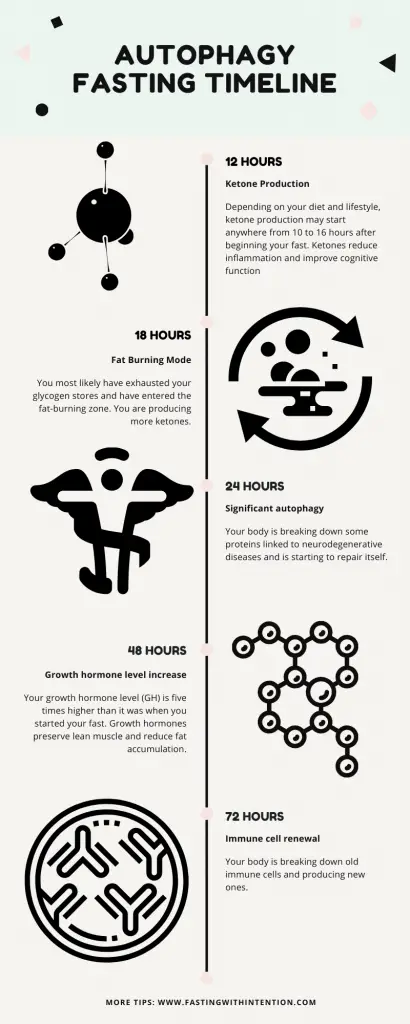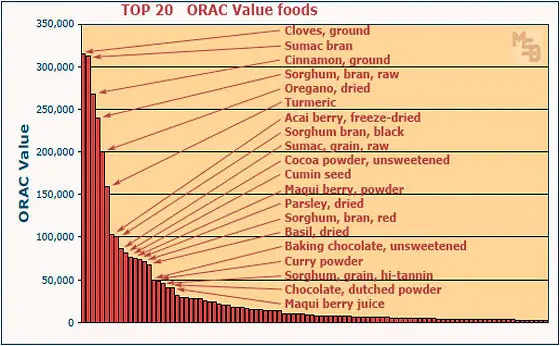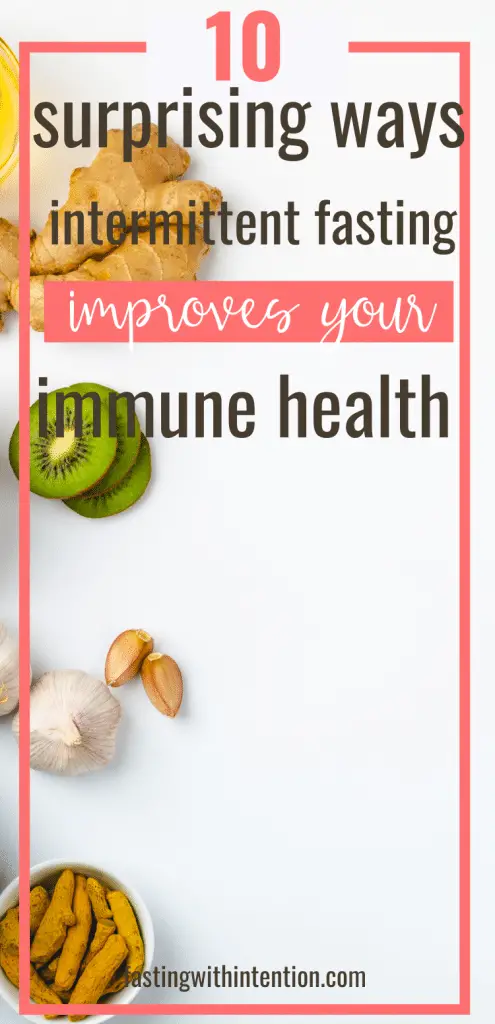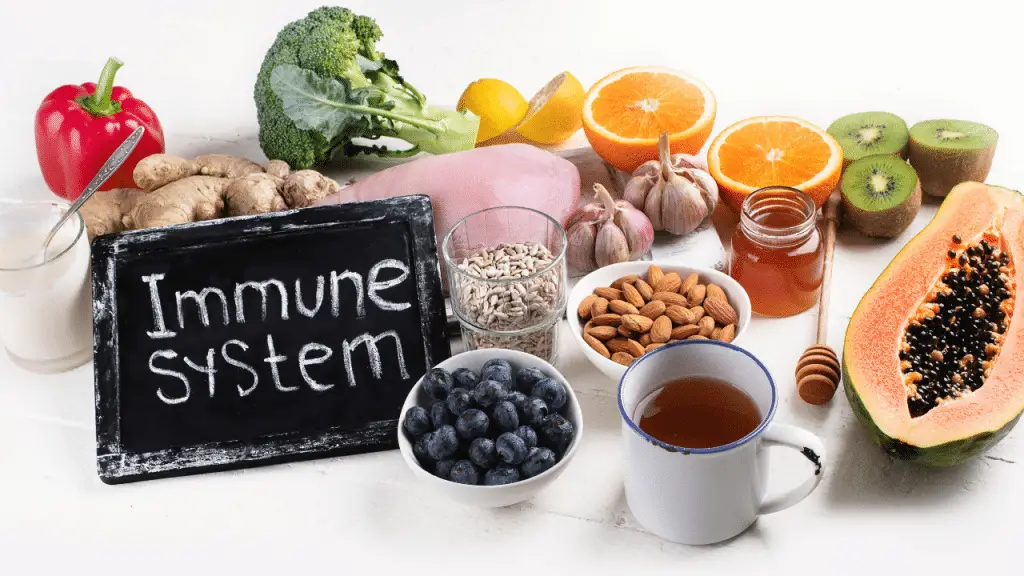Cold and flu season is upon us and I noticed that my immune function has improved since last year (when I started experimenting with intermittent fasting). Not only it took 2 weeks of children coughing and sneezing for me to feel symptoms, but I got over them within 24 hours. Now, you have to like that! I find it interesting to understand how the body works so let’s talk about the mechanism behind how intermittent fasting improves your immune health.

1. Fasting Lowers Your Monocyte Count
Monocytes? “What is that?”, you may wonder. Monocytes are white blood cells that directly attack pathogens. In particular, monocytes induce inflammation, which makes you feel under the weather, achy, and feverish. Your bone marrow is still producing monocytes when you fast, but fewer of them are released into your bloodstream. It’s like fasting creates a roadblock between your bone marrow and your blood for these cells. Moreover, it seems like they become less inflammatory.
The study was done on mice and the monocyte count was reduced after 4 hours of fasting. However, a prolonged fasting period (20 hours) even greater anti-inflammatory benefits that improve immune health.

2. Your T-Cells and B-Cells Become Supercharged
T-cells and B-cells are lymphocytes (a type of white blood cells). They are memory cells responsible for creating immunity from past infections. When you fast, they retreat to your bone marrow (as opposed to circulating in your blood). Your bone marrow is rich in vitamins and minerals, so they will not only survive there but become optimized.
3. Fasting Breaks Down Your White Blood Cells
Fasting will force your body to break down white blood cells and this depletion of white blood cells triggers the regeneration of new immune cells. Now, the subjects of the study were asked to fast regularly for 72 hours during a 6-month period. However, intermittent fasting may work in the same way through ketone metabolism.
4. Ketone Bodies Regulate Immune Function
The way the body burns fat to produce ketones can fuel the immune system to fight inflections. A 2019 study found that a ketogenic diet may help combat the flu. Again, it’s all in the production of ketone bodies, which you can achieve through intermittent fasting. Read Should You Practice Intermittent Fasting With or Without Keto? for more info.

5. Intermittent Fasting Improves Insulin Sensitivity
it’s a well-known fact that intermittent fasting improves insulin sensitivity. However, how does insulin sensitivity affect immune health? Insulin provides a necessary boost to your immune system to fight infections. Insulin seems to provide a signaling pathway to immune cells. Improving insulin sensitivity improves the effectiveness of this insulin signaling pathway. Insulin resistance causes chronic inflammation and inhibits a proper immune response.
Metabolic Health and Immune Health
The connection between metabolic health and immune health cannot be overemphasized. Intermittent fasting improves all aspects of metabolic health, including weight, hip and waist measurement, blood pressure, glucose, and cholesterol levels.
Connection Between Metabolic Health and Immune Health
Many studies have demonstrated that your metabolism influences your immune function and your immune function influences your metabolism. Undernutrition is associated with immunosuppression, which increases your risks of infection but reduces your risks of autoimmune diseases. Overnutrition (obesity) increases inflammation markers.
Intermittent Fasting to Improve Metabolic Health
It seems obvious that weight loss through calorie restriction improves metabolic health, but intermittent fasting without calorie restriction also improves metabolic health. A study in which participants had to restrict their calories to a 10-hour window found an improvement in metabolic health even though calorie restriction wasn’t required.

6. Intermittent Fasting Lowers Your Cholesterol
Another intermittent fasting benefit that is commonly mentioned is how it lowers your cholesterol. It turns out that more monocytes circulate in the bloodstream of patients with high cholesterol. As I mentioned already, monocytes are white blood cells that fight off infections. However, immune health is optimized with monocyte count in your blood is lower. Monocytes are supercharged when they remain in your blood marrow and your body will increase white blood cell regeneration when your white blood cell count is lower.
7. Intermittent Fasting Reduces Overall Calorie Consumption
Many immune health benefits related to intermittent fasting also come from an overall reduction in calories. Calorie restriction reduces T and B cells in yooru bloodstream among other benefits. As you know by now, when T and B cell count in your bloodstream is lower, your body will produce new ones and the ones you do have will be feeding off your bone marrow. I often talk about the fact that even though it is often not necessary to count calories when practicing intermittent fasting, calories do matter. It’s just that we naturally tend to eat less when practicing intermittent fasting.
Calorie restriction enhances your immune system by reducing the level of inflammation throughout your body. It helps you live longer and better.

8. Intermittent Fasting Activates Autophagy
Autophagy is your body cleaning out dead cells and replacing them with new ones. The word autophagy comes from the Greek and means “self-eating”. Obviously, that includes immune cells. For maximum immune health, a 72-hour fast is preferable, but there are many benefits that can be achieved at different times when you practice intermittent fasting. In fact, the process of autophagy initiates at around 18 hours when you fast.
Check out this autophagy fasting timeline:

If you would like to learn more about how long to fast depending on your health goals, read my post How Long Should I Fast for Maximum Benefits?
9. Intermittent Fasting Reduces Oxidative Stress
Immune cells produce produces free radicals while fighting off invading germs. These free radicals can cause chronic inflammation and damage healthy cells. Under normal circumstances, the inflammation goes away when your body has finished fighting off the invading germs, but oxidative stress can trigger this inflammatory response.
Oxidative stress means that there is an imbalance of free radicals and antioxidants in your body. It’s pretty clear that increasing your consumption of antioxidants helps avoid this imbalance, but intermittent fasting is another way.
Antioxidant Examples
Vegetables and fruits are a rich source of antioxidants. Have you heard of the ORAC Value Chart? It’s a chart that gives you the antioxidant capacity of foods. ORAC is an abbreviation for Oxygen Radical Absorbance Capacity and was developed by the National Institutes of Health in Baltimore.

Intermittent Fasting and Oxidative Stress
Intermittent fasting reduces oxidative stress through calorie restriction. A study conducted during Ramadan found that the change in body weight achieved through fasting and calorie restriction reduced oxidative stress.
10. Intermittent Fasting Improves Your Circadian Rythm
Improving your circadian rhythm improves your immune health by contributing to the prevention of metabolic syndrome, improving your sleep, and reducing inflammation. Intermittent fasting improves your circadian rhythm by keeping the same duration between meals every day.
Better Sleep
We talked about metabolic health and immune function already. What about sleep? Proper sleep is critical when it comes to immune health. You probably have heard that “sleep helps to heal.” Like every complex mechanism in your body, this relationship is bidirectional, which means that proper sleep improves immune function, but also, a healthy immune system creates better sleep.
Reduced Inflammation
Proper sleep in itself aids in reducing inflammation. Moreover, your circadian rhythm regulates changes in physiology. Studies show that immune functions are regulated by your circadian rhythms.
Intermittent Fasting for Immune Health Video





